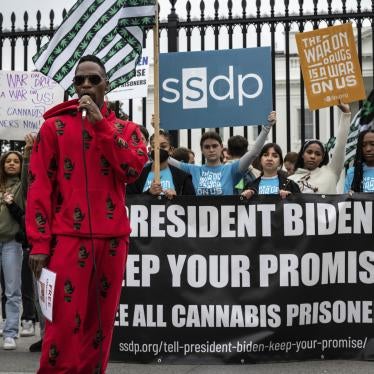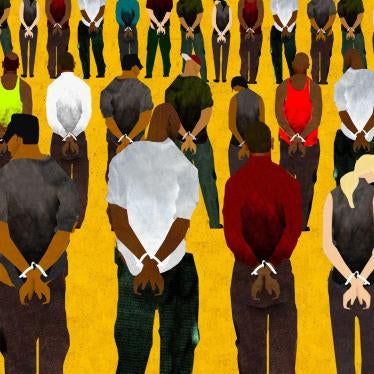A drug addict with three minor possession convictions is arrested on federal charges for dealing a small amount of crack. Question: which of these sentences do prosecutors consider an appropriate punishment: a) 10 years; b) life without parole? Answer: both.
We know this because government prosecutors in effect told the defendant, 47-year-old Sandra Avery, from Florida , that she could choose either option as punishment for her drug dealing: plead guilty, forgo a trial, and get the 10-year sentence; or go to trial, and, if convicted (as almost all federal drug defendants are), spend the rest of her life in prison.
Sandra Avery's experience is far from unique. Federal prosecutors routinely threaten severe prison sentences to coerce drug defendants into waiving their right to trial and pleading guilty. And these are no idle threats. Human Rights Watch, in a new report, calculates that defendants who insist on going to trial receive sentences on average three times as long as those who accept a plea bargain.
Still, in one key respect Avery's case is unusual. Unlike 97% of the roughly 25,000 drug offenders federally prosecuted each year, she did in fact insist on a trial. And she is now paying dearly for that choice. Avery was convicted in 2005 on charges carrying, at U.S. prosecutors' insistence, a mandatory life sentence. Whatever the judge thought of the sentence – and we don't know – he had no choice but to impose it. And since there is no parole in the federal system, Sandra Avery, who just turned 56, will end her days behind bars.
The idea that punishment should be proportionate -- i.e., "fit the crime" -- is a bedrock principle of American criminal justice, not to mention international law. But how can two punishments so starkly different both be said to fit Sandra Avery's crime? And how is it that prosecutors –- rather than a judge -- had the sole power to determine her fate?
The answer begins with mandatory minimum sentencing laws. In the "tough-on-crime" 1980s, Congress enacted statutes calling for five- and ten-year minimum sentences for drug crimes. But because mandatory sentences are keyed to the weight and type of drug involved in an offense, and take no account of the offender's specific role, federal prosecutors can -- and often do -- levy the same charges against, say, a courier who delivers a package of cocaine across town and the drug boss who received it. Meanwhile, judges, whose traditional role is to consider all the circumstances of a case and tailor punishment accordingly, were reduced to virtual bystanders.
It's bad enough that small-fry drug offenders are getting hit with sentences Congress intended for serious traffickers. Worse still, mandatory minimum laws empower prosecutors to ratchet up drug sentences way above the (already high) five- or ten-year baselines, if the defendant has a criminal history, however minor, or owns a gun, which prosecutors frequently argue is in furtherance of a drug business.
Plea agreements aren't inherently unjust. There's nothing wrong with the government offering a defendant a modest reduction off a sentence -- assuming that sentence is just and proportionate to the offense But that's not what happens in most drug cases, where prosecutors have the power to threaten (and to impose) prison terms that, in the words of one federal judge, can be "so excessively severe they take your breath away."
Many prosecutors will argue that the plea bargains they offer are reasonable and fair. But prosecutors are in the business of seeking convictions, and they generally prefer to get them without the trouble of having to go to trial. If a defendant will not plead, then considerations of fairness often fall by the wayside. A number of prosecutors told me, a longer sentence is the defendant's fault for not pleading.
Prosecutors also want defendants to help them prosecute others. The threat of harsh sentences can certainly be effective at convincing defendants to snitch. But so could beating them, or threatening to; that doesn't make it right.
In August 2013, Attorney General Eric Holder instructed federal prosecutors to avoid charging certain low-level nonviolent offenders with offenses carrying mandatory minimum sentences. But it will take more than a directive from the attorney general, which prosecutors can choose to follow or not, to restore some fairness and proportion to drug sentencing. Congress needs to step in, with legislation curtailing mandatory minimums and returning the power to determine sentences where it belongs --– with independent federal judges.
Sandra Avery was convicted of a low-level drug offense for which, arguably, even a ten-year sentence might have been too harsh. But life without parole? Avery will spend the rest of her life in prison, essentially because she refused to play ball with the government prosecutors. When the law permits the government to punish a defendant for exercising a fundamental right -- the right to a trial -- it's past time for a new law.
Jamie Fellner is senior adviser to the US Program of Human Rights Watch and author of "An Offer You Can't Refuse: How Federal Prosecutors Force Drug Defendants to Plead Guilty."






